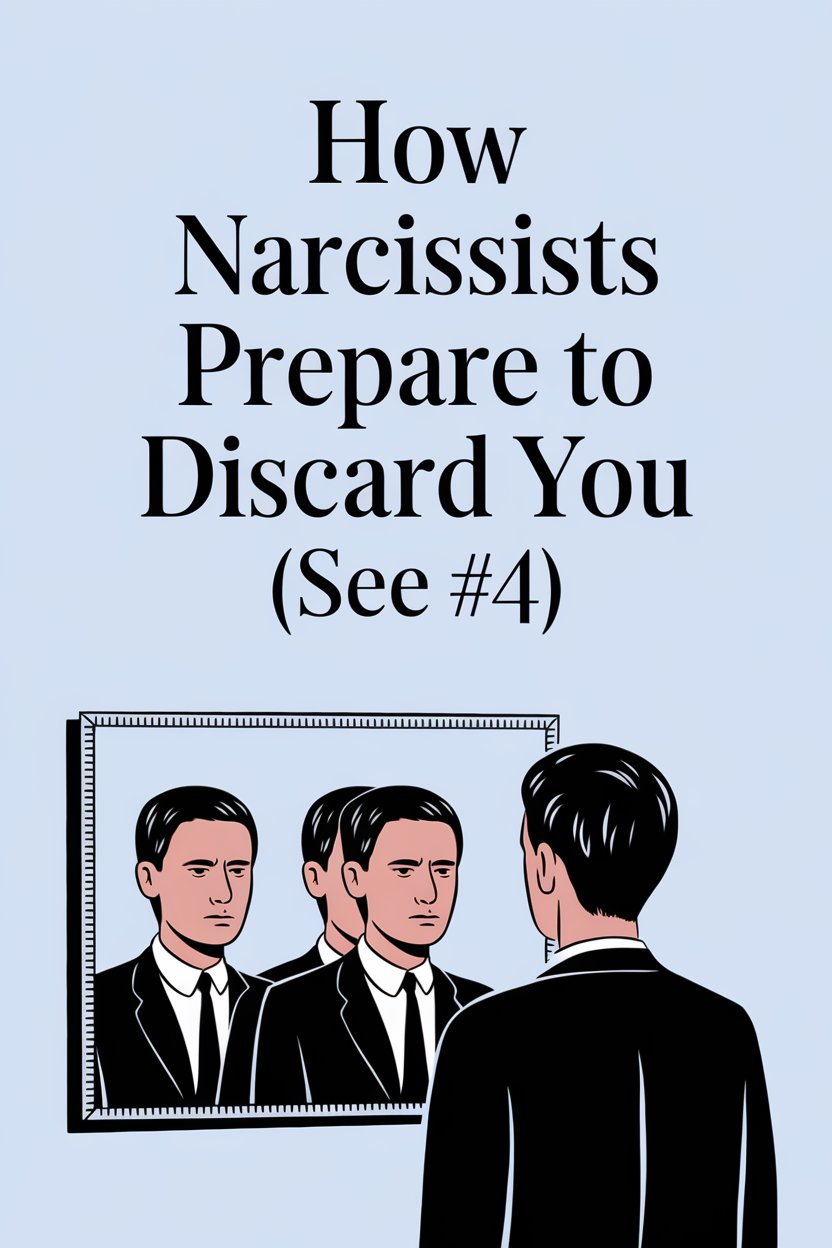If you’ve ever felt like someone was setting you up for the emotional equivalent of being ghosted by your own reflection, you’re not alone.
When it comes to narcissists, the discard phase isn’t as spontaneous as it might seem. Nope, it’s a well-choreographed dance—just not one you’d want tickets to.
Grab your emotional popcorn. The show’s about to start.
1. Shifting From Idolization to Indifference
Nobody flips faster than a narcissist who’s started to see you as ordinary. At the start, you could do nothing wrong.
Your jokes? Hilarious. Your quirks? Endearing. Your slightly burnt toast? Michelin star.
Now, suddenly, those same things are annoying, boring, or invisible.
The narcissist isn’t bored by you; they’re bored by your humanity. Perfection isn’t sustainable, and the minute you show a crack, the mask of adoration slips.
Conversations go from long, insistent texts to monosyllabic responses best suited for a moody teenager. You might get the sense that your superfan has left the building.
If you start to notice a chill in the air and you didn’t leave the window open, it’s likely the narcissist is pulling back emotionally. This is less about you and more about the fantasy they were projecting onto you—now replaced by the thrill of something (or someone) new.
2. Planting Seeds of Doubt
Gaslighting isn’t just a word tossed around on reality TV. For narcissists, it’s a strategic tool. But the discard phase is their time to shine.
They’ll start dropping “innocent” comments that make you question your own reality. “Did I really say I’d meet you at 7?” or “I think you’re being too sensitive.”
The aim is simple: destabilize your confidence and make you second-guess yourself as often as possible.
A narcissist on the verge of discard wants you off balance. If you’re confused or doubting your own memory, you’re far less likely to call out their bad behavior.
Basically, they’re gaslighting you into compliance while quietly making you easier to drop.
3. Creating Distance—Physically and Emotionally
When “busy” becomes their new middle name and plans with you are penciled in with disappearing ink, you’re seeing the classic retreat. Narcissists prepare to discard partners by making themselves less available.
Suddenly, their phone is always on silent. They’re working late, catching up with an old friend, or dealing with a crisis—again.
It’s not just physical absence. Emotional distance is the real trick. They’ll start withholding affection, ignore texts, or avoid conversations that once felt natural.
The result? You start to feel needy for wanting a normal level of attention—which, incidentally, works out just fine for the narcissist’s narrative.
Don’t be surprised if you find yourself rationalizing their absence. (“He must be really busy at work.” “She’s just tired lately.”) That’s part of the magic trick: getting you to explain away their withdrawal.
4. Lining Up the Next Supply
Narcissists are always on the hunt for new admirers, fresh audiences, or anyone who can provide them with that oh-so-sweet validation. Before they leave you, they’ve often already found someone else – or at least started looking.
This doesn’t always look like obvious cheating (though sometimes it does). Watch for secretive texting, sudden bursts of social activity, or the classic “just friends” being mentioned a little too often for comfort.
If you find their energy for others mysteriously triples as it tanks for you, warning bells should be blaring.
While you’re still in the relationship, you might notice they suddenly care more about their appearance or start talking about someone new in glowing terms.
It’s not about you; it’s about making sure their ego will have a soft place to land while yours gets tossed out like last week’s leftovers.
If you’re seeing this, you’re not paranoid. Narcissists rarely leave one branch without another to swing to.
5. Picking Fights Over Petty Things
Ever noticed how every little thing you do suddenly becomes an issue? That’s not your imagination. Narcissists heading for the exit ramp start manufacturing conflict for sport.
This could look like them nitpicking your habits, blowing up over minor misunderstandings, or outright accusing you of being impossible.
These squabbles serve a purpose—narcissists want you to be the “bad guy” so their departure feels justified, at least to them (and anyone they might want to impress with tales of your supposed villainy).
It’s classic misdirection. If they can get you to lose your cool or apologize for breathing too loudly, they can waltz out with a perfect excuse.
6. Playing the Victim Card
Narcissists love a good sob story—especially their own. As the discard approaches, you might notice a sudden uptick in tales of how hard you’ve made things for them.
They’ll act wounded, misunderstood, or neglected, painting a picture of themselves as the real casualty.
You might catch yourself apologizing for things you didn’t do, or feeling guilty for disagreeing. This is no accident.
By flipping the script, they not only justify their own bad behavior, but they also gather sympathy from friends, family, or the next unfortunate soul in their orbit.
Don’t buy the ticket to their pity party. This stage is as much for their benefit as it is for the outside world they want to convince.
7. Ghosting With Style
The grand finale: disappearing in a cloud of ambiguity. The narcissist’s discard isn’t always a dramatic slam of the door. Sometimes, it’s more like an extended fade-out.
Messages go unanswered. Calls are ignored. Plans get canceled at the last minute, or forgotten altogether.
They want you to be the one left wondering, “Did I do something wrong?” This ambiguity is intentional—it leaves you chasing closure while they move on, free from responsibility.
If they do offer an explanation, expect it to be as vague and unsatisfying as a decaf coffee.
One parting gift: they may return for a quick encore, dropping back into your life just long enough to remind you of what you’re missing.
This is called “hoovering,” because apparently, even narcissists appreciate a good vacuum metaphor.
What to Do If You Spot the Signs
Recognizing the discard in progress isn’t exactly a pleasant revelation, but it’s empowering. If you’re picking up on these behaviors, the best move is to put yourself at the center of your own story again.
Start emotionally detaching and fortify your support system. Friends, family, even your group chat—lean in. Document behaviors if you need to, both for your own clarity and any future conversations.
Resist the urge to seek closure from the narcissist. This is one plot twist you won’t get to write.
Instead, focus on reclaiming your energy and setting boundaries that protect your self-worth—a quality that, with or without them, was never in question.
Reclaiming Your Peace After the Discard
If you’re reading this and thinking, “Wow, all seven rings of the circus have come to my town,” take a breath. T
he narcissist’s discard isn’t a reflection of your worth, but of their own inability to face reality without an audience and a backup plan.
You get to decide what comes next. Healing after a narcissist means drawing your circle tight, rediscovering your own joy, and refusing to let someone else’s inability to love shape your story.
Turns out, the only real magic trick is remembering you’re more than anyone’s supply. Even if you were once the main act, there’s a bigger, better show waiting—starring you.


